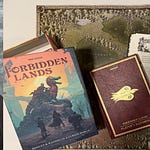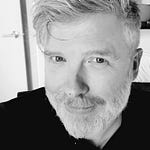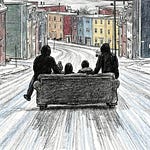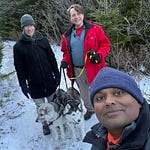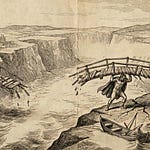If you are looking for links to various sources, materials and sites cited in the show, please scroll to the end. The article that inspired this episode is Yair Rosenberg’s The Atlantic piece: The MAGA Influencers Rehabilitating Hitler.
I only met Moishe Kantorowitz once in my entire life, some 30 years ago. I have remembered his name ever since. This is not something I can say about most people that I have spent a couple of hours with.
Moishe—I hope I can get away with referring to him by his first name—came to talk to the History graduate students at Memorial University of Newfoundland, of which I was one. He was, in my memory at least, a quiet man. He came in, sat at the head of the classroom; there were some ten of us and a few professors. I can't remember when, but he rolled up his shirt, turned his arm, and showed us the tattoo of his number from Auschwitz. He talked about the forced march from what is now Belarus. He talked about what that felt like, how starved he was, and what it was like to lose all his family.
Moishe was the first and only Holocaust survivor I have ever met in person.
A decade later, I was coming down a long mountain hike in the Rockies with a dear friend, and we had incorrectly calculated the amount of water we needed. That interminable hike scrambling up a thousand metres felt like the end of the world. In that moment, for some reason, Moishe's face and his story popped into my mind. I remember thinking, how can I possibly feel so terrible when what I was experiencing was not even an iota of what he experienced?
The reality is though, unlike people I have met in Europe, in Canada, and the United States, I do not have any family ties to this war. There are no strange Sri Lankan great-uncles who found themselves traversing the countryside of Europe in World War Two. But it doesn't matter.
It shouldn't matter.
The lessons of the Holocaust and of the German Concentration Camps are there plain and simple. The hatred on display was staggering: groups of people, most of all the Jewish people, were made out to be nothing more than animals to be experimented upon and finally exterminated.
Do not hate the German people; what happened and this hatred is possible for anyone, anywhere, "anywhen". Do not say, "It cannot happen to us." Instead, ask the question, "When will it happen again?" In the 20th century, genocides have happened in too many societies, from the Rwandan genocide to the Cambodian Killing Fields.
There are of course many theories on why we commit genocide as a species. The one I ascribe to starts and ends with the mushy stuff between our ears. Neuroscience tells us not only that our brains are incredibly malleable, but that we also basically function in an illusion of the world as we have created it. For example, you can actually manipulate the brain to think you have a third arm. If you are reading this on your daily commute, I am sure that you cannot even imagine hurting one of your fellow passengers. Then again, that annoying mosquito, well, that's another story. Unfortunately, our brains can create models where you are part of an in-group and the others, well, they could just as well be one of those mosquitos. The term is "otherization". It's when we refer to "those people."
I have heard this term so often. A well-educated person used that expression to describe a homeless First Nations man in Edmonton, Canada. A Sinhalese person I met used it to describe a Tamil person some decades ago in Sri Lanka. A Finn used that term in a professional setting when talking about African immigrants to Finland. Politicians the world over use it to refer to their opponents. "Those people," the ones who are not like us, the ones that don't belong, the ones that ought not to be treated like you and me. Heck, I know, judging by at least one beer bottle thrown at me, I have been one of "those people."
There's not much distance from referring to "those people" to a place where you condone violence or aggressive action towards that same group. From there, it's not very far towards the extremes we have seen the world over. For the reader that says you are crazy, that's fine: I just know that I am no different than anyone else. I can be swayed, I can be desensitized, I can commit violence through inaction as much as action. I have seen the "other" in business settings: leaders who denigrate their staff in whole or in part and staff who talk of their leaders like some caricatures from Dilbert. We create mental models of people around us, we group them into our in-groups and out-groups, we perform actions against them whether that be simply in thought, by voice or, in the extreme, with physical violence.
There is a solution. There is very little that differentiates us as human beings. We all have different external colours and appearances, we have different beliefs, we have different preferences. However, for the most part, the similarities outweigh the differences. When I show you a green leaf, you nod at our shared greenness. We laugh, we cry, and we love in the same way. The more you talk to another person, the more you learn. The more you share, the more you connect. The more you listen, the more you understand.
The solution, if I could make it happen, is for everyone to meet every other "type" of person. When you meet the homeless person and understand that he was like you until his divorce left him in a depression where he lost his job and couldn't afford the medication. When you meet the gay man and you realize that you share a passion for the same movies. When you meet the immigrant and you realize that you both had mothers who loved gardening.
The solution is the continuous updating of your mental models through new meeting new people. I would love for each person to experience life in another country, in another state, in another province. We can seek to bring those of differing views together so they can have a sensible dialogue, maybe by starting with what makes us similar instead of what makes us different. We can try not to lump "right wing" and "left wing" people into groups and instead seek out people with different views. I don't expect people to change overnight, but I do believe the more you experience, the more you change your internal assumptions.
This is when I remember Moishe, and not just him, but so many other people that I have met who have changed my internal assumptions and models. We must never forget history; we must never fail to pass on our history; we must always tell our stories. In those stories, we have the possibility to change one person, and just maybe, that one person is enough. I hope that when you hear someone saying "those people," you remember that some of "those people" never saw their parents again because other people saw to it that "those people" were exterminated.
Moishe Kantorowitz passed away in 2008. He received an honorary degree from Memorial University of Newfoundland for his work in Holocaust education. His book, published by Azrieli Foundation’s Holocaust Survivor Memoirs Program and distributed by Second Story Press, is called Lament. I never knew Moishe beyond that one single time that I met him. That one time though, he told me a short story of his life, which I have remembered ever since, and I thank him for this kindness.
In the podcast episode, you can listen to excerpts from the film reels produced when the United States Department of Defense liberated German Concentration Camps in 1945. This film is in the Public domain and available on the Internet Archive
The excerpt from Moishe Kantorowitz’ memoir Lament is read with permission of the Azrieli Foundation’s Holocaust Survivor Memoirs Program the book Lament will be launched in St. John’s on September 18, 2025. It is entirely by coicidence that this is happening at the same time as this episode. Please purchase your copy of Lament at Second Story Press
The biography I read is from the Montreal Holocaust Museum and can be read in full here. There are also photos of Moishe throughout his life.






